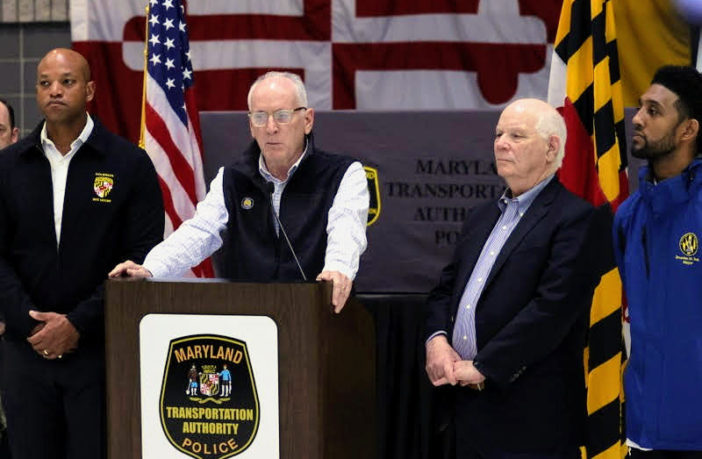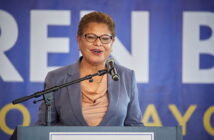By Tashi McQueen
AFRO Political Writer
tmcqueen@afro.com
Maryland Gov. Wes Moore, along with other local, state and federal officials, announced the opening of another temporary channel on April 2. The channels have partially reopened the Port of Baltimore’s waterways as clean-up and salvage efforts continue where a portion of the Francis Scott Key Bridge collapsed on March 26.
“We opened another channel today at around 13:15 or 1:15 and it measures 14-foot depth,” said Moore. “These channels will support traffic from small boats and yesterday we had one fuel barge and one scrap barge move through the temporary channel.”
The first channel measured 11 feet deep.
The Key Bridge fell after the Dali container ship collided with the bridge in the early morning hours of March 26.
Moore, Baltimore Mayor Brandon M. Scott, Baltimore County Executive Johnny Olszewski and other local, state and national officials have gathered in the days since to try and clear the federal waterway, find the six victims and start rebuilding the bridge.
Even with this progress, Moore stresses that there is still much to be done before operations at the port are back to normal.
“We are still a long way from being able to get the size and the cadence of the commercial traffic back to where it was before the collapse,” said Moore. “Rough weather has forced this team to pivot over the last 24 hours. This morning crews were setting buoys in the rain to make sure vessels could navigate the waterways.”
According to U.S. Coast Guard Rear Admiral Shannon Gilreath, a third channel is coming but when it is opened depends on the removal of debris around the bridge.
The governor also announced that his office is working with the Maryland General Assembly to support efforts to recover from the collapse. He said his team is pushing for several amendments to the Maryland Protecting Opportunities and Regional Trade (PORT) Act, which Maryland Senate President Bill Ferguson and Del. Bill Clippinger introduced it on March 29.
“The bill will be authorizing the administration to establish certain programs targeted at those who are the most negatively impacted,” said Ferguson to the AFRO.
Ferguson continued, adding that the bill is aimed at helping “workers of the port, who can’t work because ships can’t come in or out” and “small businesses that are associated with port operations who want to keep employees on, but without the work there is no revenue.”
“For this temporary period, it would be emergency funding to help them keep employees hired,” he said.
Gov. Moore highlighted three of those proposed amendments.
“We proposed the creation of a new permanent scholarship program for the families of transportation workers who die on the job,” said Moore. “The work that these men and women do every single day is both essential and dangerous. We must ensure that when there are tragedies like this one that the state does not forget about their children and their families.”
The second amendment his office proposed would create flexibility in work search requirements for unemployment insurance so port workers who receive unemployment insurance will be ready to get back to work at the port at the appropriate time.
“We proposed an amendment that will ensure flexibility for our Department of Commerce and our Department of Labor because our goal is to make funding available for critical needs of workers and businesses as we move forward Mission first and people as we move forward,” said Moore.
There are currently two business resource centers, one permanent and one temporary. The permanent location is Baltimore City and the Baltimore County one is temporary, though Moore said a permanent one for Baltimore County is on the way.
Maryland Transportation Secretary Paul Wiedefield said officials will monitor potential increased aging of infrastructure due to the pressure diverted traffic will put on the Harbor tunnel, which opened in 1957, and the Fort McHenry tunnel, which opened in 1985.
“We’ve seen approximately 15,000 additional vehicles a day in the Fort McHenry tunnel and about 7,000 in the Harbor tunnel,” said Paul Wiedefield. “Over time, yes, that will have an impact. What we will do is monitor the condition of those facilities and make any necessary improvements to make sure that the safety of those facilities are maintained.”
Tashi McQueen is a Report For America corps member.



